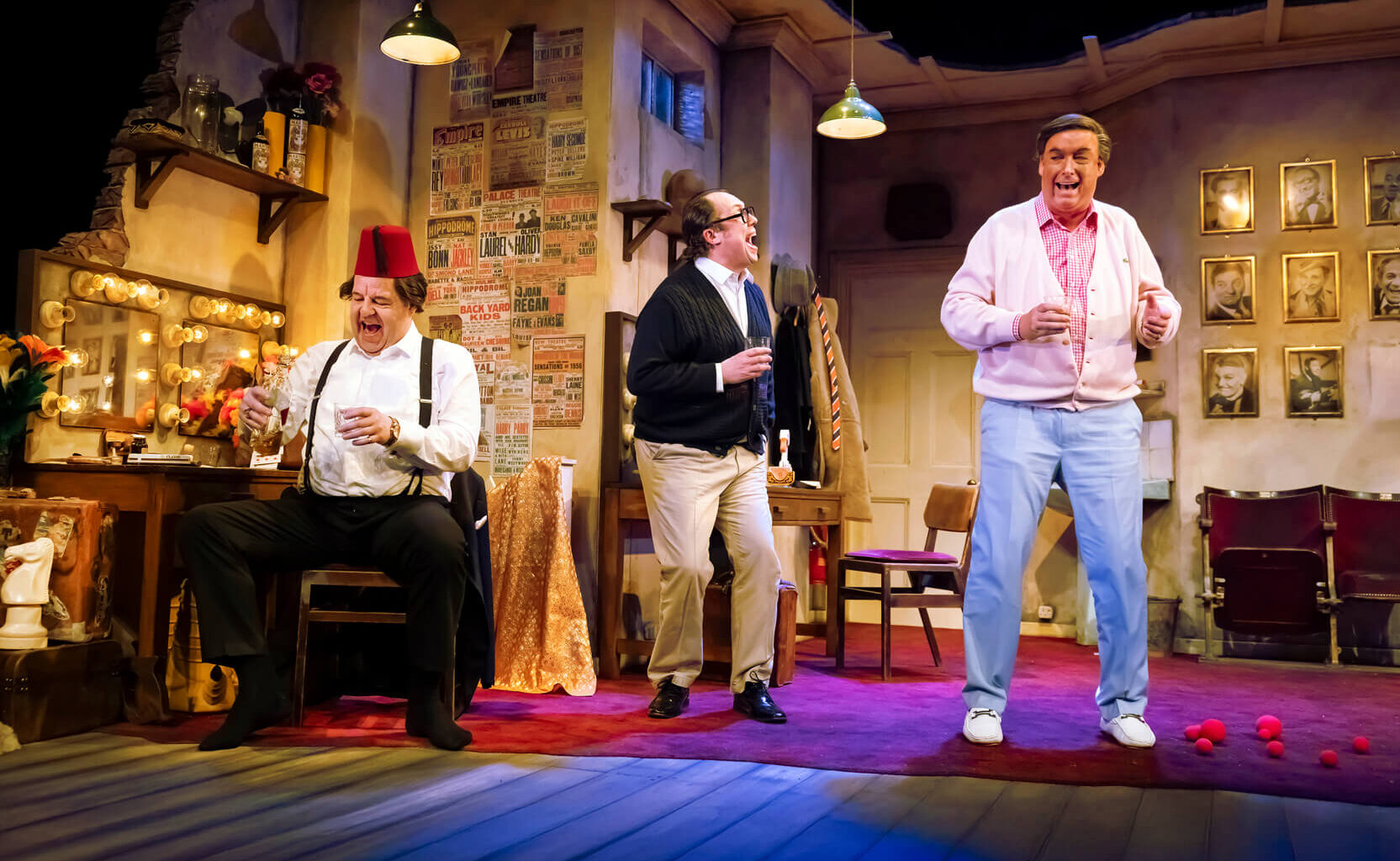Writer and Director: Paul Hendy
This production is a loving, affectionate tribute to three absolute titans of British comedy – Tommy Cooper, Eric Morecambe and Bob Monkhouse. Three consummate actors – Damian Williams (Cooper), Bob Golding (Morecambe) and Simon Cartwright (Monkhouse) – bring the comic legends uncannily to life before your very eyes and for those in the audience who never saw them perform live they are as near to the real thing that you are likely to get. But this is far more than an extended impersonation or impression – it is a skilful and at times a very poignant depiction of the very souls of these three giants that has you splitting your sides in laughter one minute and close to tears of sorrow the next. The whole thing is a delicate balance between slapstick and nostalgia, classic one-liners and melancholy, that makes you realise just what geniuses these three were and yearn their passing all the more.
The play is in essence a homage rather than a straightforward narrative and it is evident that it relies heavily on the audience already getting the various references – it takes as read an already existing affection that is self evident when the show bombed in New York because the audience just didn’t know who these three men were and what was their significance. But even if this was the case it still asks some very important and universal questions such as what does it mean to sacrifice some of your own life in order to make others laugh and who really owns a joke – the writer or the performer? This last is explored at some length mainly by Monkhouse who was notoriously meticulous in analysing comedy and was responsible for thousands of one-liners and comedy routines.

The setting is a ramshackle dressing room where the three legends are preparing to perform together one last time. It is lined with posters and black and white portraits of comedy greats such as Max Miller, Arthur Askey, Tony Hancock and Will Hay and the atmosphere is completed by a variety of props lying about, some of which are used and supply a running gag such as the card trick operated by a duck and others are for display only like the “alas poor Yorick” skull which is front of stage and never used or alluded to (a missed opportunity?) but provides a chuckle to those initiated. The final scene is very emotional as Cooper places his own portrait in the one empty space on the board as he gets his final curtain call to take his place on the stage – the stage on which he famously died whilst performing. As Monkhouse says to him earlier – you’d even get a laugh if you died on stage.
All three actors are brilliant in their roles, excelling not just in a prolonged impersonation of their idols but in bringing out their very beings with all their insecurities, hang-ups and motivations. Damian Williams, a Sheffield favourite from panto, is naturally funny and is perfect casting for Cooper both in physical size and demeanour. He doesn’t even have to say anything to get a laugh (much like his alter ego) and he milks the audience for all its worth. Whether it be a lifted brow or a wonky stumble he brings the house down. When Bob Golding makes his first entrance as Eric Morecambe it’s as if the real Eric has been reincarnated, bounding on to the stage with charm and verve with his characteristic smile and energy. Golding has a real affinity with the real Morecambe and his family and has had the privilege of playing him for twenty years and it’s almost as if he has morphed into his hero, getting his voice, mannerisms and gestures down to a tee whist simultaneously showing not a little skill with the ukulele and singing. Simon Cartwright has the look, demeanour and voice of Monkhouse pitch perfect and his portrayal is uncanny. His is a more measured performance in keeping with the man himself, full of nuance and sensitivity and all the more effective for being underplayed. All three actors knew their respective heroes personally and have used inside knowledge to invest their performances with expertise and authority.
The Last Laughis in effect a love letter and a celebration of three men whose humour shaped a whole generation. With its use of familiar gags and a real warmth it has a deep affection for the art and craft of comedy. It’s a combination of gags, routines, song snippets and philosophical musings about all aspects of comedy including timing, legacy and the addictive nature of chasing the next laugh. The ghosts of Tommy, Eric and Bob would surely approve of such an enduring accolade.
Runs until 5th July 2025, before continuing on tour
